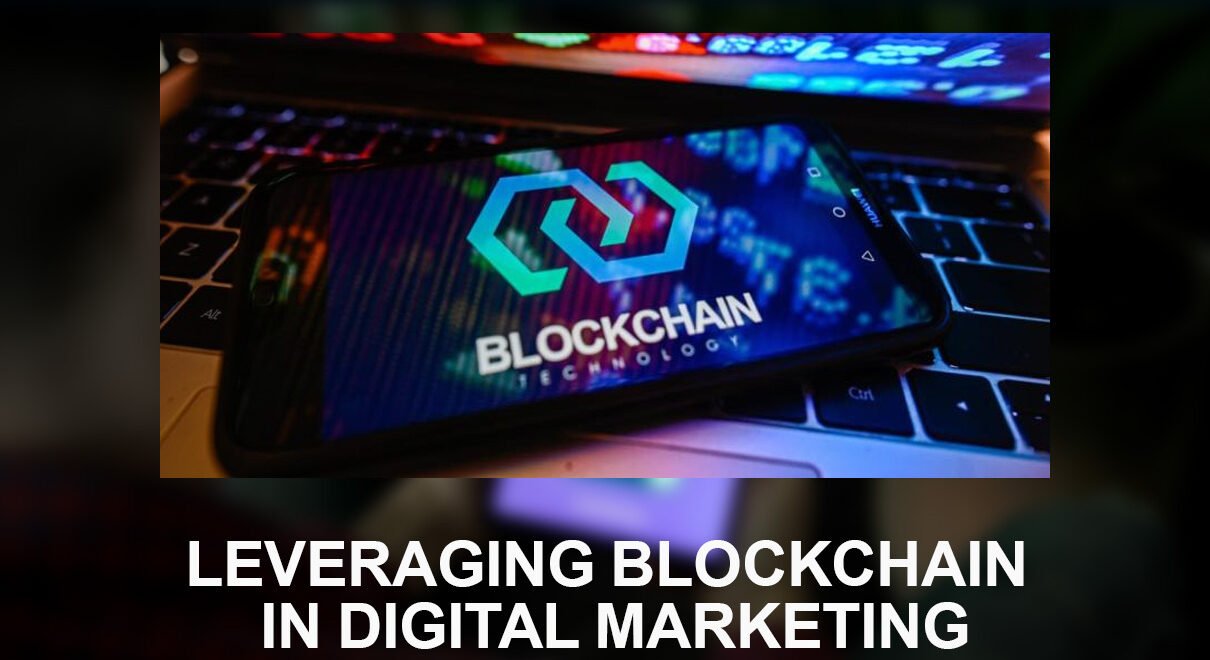Introduction to Blockchain in Digital Marketing
Blockchain technology represents a transformative shift in how data is stored, managed, and transferred across digital platforms. At its core, blockchain is a decentralized digital ledger that enables secure transactions and record-keeping through a network of computers. This decentralization eliminates the need for a central authority, minimizing the risk of fraud and enhancing data integrity, which is critical across various industries, particularly in digital marketing.
One of the defining characteristics of blockchain is its transparency. Each transaction on the blockchain is publicly recorded, providing a clear audit trail that can be viewed and verified by all participants. This level of transparency not only fosters trust among users but also allows businesses to track the effectiveness of their marketing strategies in real-time. Additionally, the immutable nature of blockchain means that once information is added, it cannot be altered retroactively, thereby increasing accountability in digital transactions.
Security is another paramount feature of blockchain technology. Leveraging advanced cryptographic techniques, blockchain protects data from unauthorized access and cyber threats, which are increasingly prevalent in today’s digital landscape. This heightened security is especially crucial for marketers who handle sensitive consumer information and strive to maintain compliance with data protection regulations.
Blockchain’s relevance extends beyond its basic functionality; it has the potential to revolutionize digital marketing by introducing innovative solutions such as improved data privacy, enhanced customer engagement, and the possibility for new revenue models through tokenization. With its ability to streamline processes, enhance customer trust, and create more tailored marketing strategies, blockchain technology is poised to significantly impact the landscape of digital marketing as we approach 2024.
Current State of Digital Marketing
The digital marketing landscape in 2023 has undergone significant transformation, shaped largely by the integration of advanced technologies and a growing emphasis on consumer privacy. Marketers are increasingly recognizing the importance of safeguarding customer data, propelled by heightened public awareness and regulatory pressures. Data privacy concerns have gained prominence, as consumers demand transparency in how their personal information is used, prompting brands to revise their marketing strategies to establish trust and maintain long-term relationships.
In response to these challenges, the focus has shifted towards more personalized marketing approaches. Businesses are leveraging customer behavior data to create tailored experiences that resonate with individual preferences. This customization not only aids in increasing engagement but also improves conversion rates. Utilizing artificial intelligence and machine learning, marketers are capable of analyzing vast datasets to identify consumer trends, predicting future behaviors, and developing targeted campaigns that speak directly to distinct demographics.
Simultaneously, there has been a marked increase in the reliance on various digital platforms for advertising. Social media channels, search engines, and online marketplaces play pivotal roles in reaching prospective customers effectively. As these platforms evolve, marketers are adopting multi-channel strategies to ensure comprehensive outreach, enhancing visibility across diverse audience segments. Innovations such as influencer marketing and interactive content are emerging as prominent features in this new era of digital marketing.
However, the complexity of navigating this evolving landscape presents challenges, particularly in the realm of establishing effective metrics for success and measuring return on investment. Thus, as we explore the potential applications of blockchain technology in digital marketing, it is essential to recognize how it can provide solutions to these contemporary challenges, ultimately reshaping the marketing ecosystem for the better.
The Intersection of Blockchain and Digital Marketing
As the digital marketing landscape continues to evolve, the integration of blockchain technology presents exciting opportunities for brands seeking to enhance their strategies. Blockchain’s decentralized nature fosters transparency, security, and efficiency, which are essential attributes in today’s marketing environment. One of the most significant ways in which blockchain intersects with digital marketing is through the use of smart contracts. These self-executing contracts facilitate automated agreements between parties, eliminating intermediaries and reducing the chances of disputes. This automation is particularly beneficial for influencer marketing, where payments can be automatically released upon the completion of specific deliverables, ensuring accountability on both sides.
Furthermore, the technology ensures secure transactions, which plays a vital role in enhancing customer trust. In a marketplace often plagued by data breaches and fraudulent activities, blockchain offers a secure way to conduct transactions by providing an immutable ledger that records every interaction. This level of security can be particularly appealing to consumers who are increasingly sensitive about their personal information. By ensuring data integrity through decentralized systems, brands can build stronger relationships with their customers, enabling them to feel more secure and valued within the brand’s ecosystem.
Several marketing use cases exemplify the conjunction of blockchain and digital marketing initiatives. For instance, companies like Brave Browser utilize blockchain to reward users for viewing ads, thereby creating a more engaging and user-centric advertising experience. Similarly, brands can leverage blockchain to verify the authenticity of their products through a transparent supply chain, effectively combating counterfeiting issues. As we move into 2024, the intersection of blockchain and digital marketing not only offers innovative solutions but also redefines customer interactions, heralding a new era of digital engagement. Ultimately, adopting these cutting-edge technologies will equip brands to navigate the complexities of the digital marketplace with greater resilience and success.
Enhanced Data Privacy and Security
In recent years, the increasing concerns regarding data privacy and security have prompted significant shifts in how brands manage and protect personal information. Blockchain technology presents a compelling solution to these challenges, offering enhanced data privacy and security for both consumers and brands. By utilizing a decentralized data storage system, blockchain ensures that personal information is distributed across a network of computers, rather than being stored in a single, centralized location. This decentralization minimizes the risk of data breaches, as there is no single point of failure that hackers can exploit.
Moreover, blockchain technology operates on a principle of transparency, which allows consumers to have greater control over their data. They can choose what information to share, with whom, and for what purpose. This user-centric approach aligns closely with the requirements of regulations such as the General Data Protection Regulation (GDPR), which emphasize the importance of user consent and data protection. As brands adopt blockchain solutions, they can better comply with such regulations, instilling confidence in their customers about how their data is handled and protected.
Building trust through transparent data practices is crucial in today’s digital marketing landscape. Brands leveraging blockchain can effectively communicate their commitment to data privacy, thereby fostering a strong relationship with their consumers. By demonstrating adherence to regulatory frameworks and the implementation of secure, decentralized systems, brands can differentiate themselves from competitors who may not prioritize data security. Ultimately, incorporating blockchain in digital marketing not only enhances data privacy but also contributes significantly to brand reputation and consumer loyalty.
Innovative Advertising Models through Blockchain
The advent of blockchain technology is revolutionizing the digital marketing landscape, particularly through the introduction of innovative advertising models. One of the primary applications of blockchain is in programmatic advertising, which automates the buying and selling of online advertising space through real-time auctions. By utilizing blockchain’s transparent and immutable ledger, advertisers can verify the authenticity of impressions and clicks, leading to significantly improved trust and accountability within the digital advertising ecosystem.
Additionally, blockchain facilitates micropayments, allowing advertisers to compensate users for their attention or interactions with ads in a more granular and efficient manner. For instance, instead of a lump sum payment for ad placements, brands can implement a model where users receive small payments each time they engage with an ad. This not only incentivizes user engagement but also supports a more equitable distribution of revenue within the advertising chain. As a result, advertisers can target their spending more effectively, establishing a direct connection between ad exposure and compensation.
Moreover, a token-based rewards system can foster increased customer loyalty and engagement. By integrating cryptocurrencies or brand-specific tokens, brands can encourage users to participate in advertising campaigns through rewards for sharing content or participating in surveys. This not only drives engagement but also builds a community around the brand, as users feel a sense of ownership and reward for their participation. Such systems provide valuable data that can enhance audience targeting, as brands gain insights into user behavior and preferences.
Ultimately, the innovations brought forth by blockchain technology in advertising are paving the way for more efficient ad spending. With improved targeting capabilities and measurement of advertising effectiveness, marketers can adapt their strategies to meet the evolving demands of their audience. This convergence of technology and marketing not only curtails wasteful spending but also amplifies the overall return on investment.
Challenges of Implementing Blockchain in Marketing
The integration of blockchain technology into marketing strategies presents a range of challenges that brands must navigate. One of the primary hurdles is the technical complexity associated with blockchain. Many marketing teams may lack the requisite expertise to implement and manage blockchain solutions effectively. This technical gap can lead to difficulties in integrating blockchain with existing marketing infrastructure and can hinder the potential benefits that blockchain offers, such as transparency and improved data security.
Furthermore, the current state of blockchain adoption varies significantly across regions and industries. In certain areas, brands find themselves grappling with a lack of regulatory frameworks and standards, which can create uncertainty around how to utilize blockchain effectively. This inconsistency can inhibit organizations from fully committing to blockchain initiatives in marketing due to concerns over compliance and legal implications. As a result, brands may postpone or reevaluate their blockchain strategies, delaying the potential advantages of this innovative technology.
Moreover, the concept of blockchain is relatively new, and there may be considerable resistance to adopting this technology within marketing teams or organizations. Employees accustomed to traditional methods may be skeptical about the necessity and effectiveness of transitioning to a blockchain-based approach. Overcoming this resistance requires not just education and training, but also the demonstration of tangible benefits that blockchain can provide, such as enhanced customer trust and improved ROI on marketing campaigns. Thus, fostering a culture that embraces change and innovation will be vital for any organization looking to leverage blockchain in their marketing strategies.
Case Studies: Brands Successfully Using Blockchain
In the evolving landscape of digital marketing, several brands have successfully harnessed blockchain technology to enhance their marketing strategies and improve customer engagement. One notable example is Coca-Cola, which has implemented a blockchain-based supply chain management system. The objective was to increase transparency and traceability in its beverage supply chain. By using blockchain technology, Coca-Cola was able to track every stage of its products, providing consumers with real-time information about the journey of their beverages from the factory to the store. This initiative not only improved operational efficiency but also empowered consumers with more trust in the company’s products.
Another prominent case is Unilever, which adopted blockchain to combat digital ad fraud. The company aimed to ensure that its advertising budget was being spent effectively. By leveraging blockchain technology, Unilever was able to verify ad placements and confirm that ads were reaching the intended audience. The implementation involved collaboration with various digital advertising platforms that supported blockchain. This innovative approach resulted in significant cost savings for Unilever while enhancing the overall effectiveness of its advertising strategies.
Moreover, a luxury fashion brand, Prada, ventured into blockchain to establish authenticity for its products. The brand’s objective was to provide verifiable proof of origin for its luxury items. By integrating blockchain into its marketing strategy, Prada enabled consumers to scan QR codes on their products, leading to a digital ledger that confirmed the product’s authenticity and production journey. This not only engaged customers through interactive experiences but also reinforced the brand’s reputation in the luxury segment by solely focusing on authentic goods.
These case studies exemplify the versatility of blockchain in addressing diverse marketing challenges across industries. Brands that effectively implement blockchain can not only enhance their operational capabilities but also build deeper connections with their customers through transparency and trust.
Future Trends: What to Expect in 2024
As we approach 2024, the intersection of blockchain technology and digital marketing is poised for significant evolution. The anticipated advancements in blockchain will fundamentally alter how brands interact with consumers, driven by innovations that enhance transparency, security, and personalization. One of the most notable trends expected in 2024 is the increase in decentralized advertising networks. These platforms will leverage blockchain to facilitate direct transactions between advertisers and consumers, minimizing intermediary costs and increasing trust.
Furthermore, the rise of Non-Fungible Tokens (NFTs) in marketing is likely to continue, with brands exploring new ways to engage customers through unique digital assets. These assets not only provide a mechanism for loyalty programs but also enable brands to create one-of-a-kind experiences that resonate with consumers. As NFTs gain traction, the market is expected to expand, allowing brands to tap into younger demographics eager for exclusive content and rewards.
Technological advancements will also lead to improved tracking and analytics capabilities on blockchain. Marketers will benefit from enhanced data privacy, as consumers become increasingly aware of how their data is used. Blockchain’s inherent ability to secure data will allow brands to analyze consumer behavior without compromising personal information, fostering more trustworthy relationships.
In addition to these innovations, regulatory changes will likely shape the landscape of blockchain in digital marketing. Governments around the globe are beginning to form policies that address concerns around advertising transparency and consumer protection. As regulatory frameworks evolve, brands will need to adapt their strategies to ensure compliance while maximizing the potential of blockchain technology.
Overall, 2024 is set to be a transformative year for digital marketing, with blockchain playing a pivotal role in defining new approaches to branding and customer engagement.
Conclusion: The Future of Marketing with Blockchain
As we look to the future of marketing, it is clear that blockchain technology will play a pivotal role in shaping its landscape. Throughout this discussion, we have explored how blockchain can enhance transparency, data security, and consumer trust in digital marketing practices. The evolving capabilities of blockchain, such as smart contracts and decentralized applications, present innovative solutions that can address many of the traditional inefficiencies within the marketing ecosystem.
The integration of blockchain into digital marketing strategies not only improves the accountability of advertising spend but also ensures a more personalized consumer experience. With the capability to track consumer data securely, brands can engage with their audiences in a more targeted manner, ensuring that marketing efforts are efficient and relevant. Moreover, as consumers become increasingly aware of privacy issues, the demand for secure and transparent data handling will only grow, further cementing the necessity of blockchain technologies in this field.
Additionally, our discussion highlighted the importance of adaptability for brands looking to leverage these innovations successfully. As the digital marketing landscape continues to evolve rapidly, staying informed about emerging trends and technologies will be crucial for businesses. Companies must invest in understanding blockchain’s applications and its potential to enhance their marketing strategies. This adaptive approach will not only prepare organizations for the future challenges of digital marketing but also enable them to harness the transformative power of blockchain.
In conclusion, as we move towards 2024 and beyond, embracing blockchain technology will be essential for brands aiming to stay competitive in an increasingly complex digital marketplace. The future of marketing lies in the innovative integration of blockchain, providing the tools necessary to build stronger consumer relationships, enhance operational efficiency, and account for marketing expenditures with unprecedented accountability.







